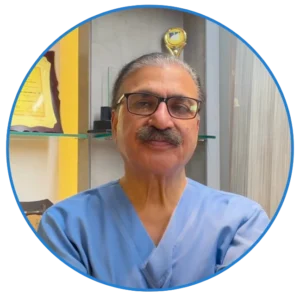Heel pain is a common condition that affects many individuals, particularly those leading active lifestyles or spending long hours, standing on their feet, like teachers, policemen, salesmen etc. If left untreated, heel pain can disrupt daily activities and reduce the quality of life. Dr. Sudhir Kapoor, a renowned Orthopaedic specialist with over 40 years of experience, offers expert heel pain treatment in Delhi, tailored to each patient’s unique needs.
In this blog, we will explore the causes, symptoms, and treatment options for heel pain, along with why Dr. Kapoor is the ideal choice for those seeking expert care.
Understanding Heel Pain: Common Causes and Symptoms

Heel pain can stem from various conditions, but the most common cause is plantar fasciitis—an inflammation of the thick band of tissue that connects the heel bone to the toes. Other causes include:
- Achilles tendonitis: Inflammation of the Achilles tendon, which connects the calf muscles to the heel.
- Heel spurs: Bony growths on the underside of the heel, often associated with long-term plantar fasciitis.
- Bursitis: Inflammation of the bursa (a fluid-filled sac) at the back of the heel.
- Stress fractures: Tiny cracks in the heel bone, common among athletes or those with high-impact activity routines.
Symptoms of heel pain include sharp or stabbing pain, particularly during the first steps in the morning or after long periods of rest. The pain typically lessens with movement but can return after extended periods of standing or walking.
Non-Surgical Heel Pain Treatment Options
At Dr. Sudhir Kapoor’s clinic in Delhi, the primary focus is on non-surgical treatment options for heel pain. These include:
- Rest and Activity Modification: Reducing activities that place stress on the heel, such as running or long walks, is crucial to allow the tissue to heal. The use of proper footwear is crucial
- Physical Therapy: Stretching exercises for the plantar fascia and Achilles tendon can help relieve pain and prevent future injuries.
- Orthotic Devices: Custom orthotic insoles can provide additional support and cushioning to the foot, reducing pressure on the heel.
- Medications: Non-steroidal anti-inflammatory drugs (NSAIDs) may be recommended to manage inflammation and pain.
- Steroid Injections: In cases where other treatments have not been effective, corticosteroid injections may be used to reduce inflammation and provide temporary relief from severe pain.
- PRP injections: Extract from the patient’s own blood can be injected, wherever indicated for the treatment of plantar fasciitis
- Extracorporeal Shock Wave Therapy (ESWT): This non-invasive procedure involves using sound waves to stimulate the healing of damaged tissues in the heel. It is an effective treatment option for chronic heel pain that hasn’t responded to traditional therapies.
Why Choose Dr. Sudhir Kapoor for Heel Pain Treatment?
Dr. Sudhir Kapoor’s vast experience and patient-centred approach make him one of the best orthopaedic doctors for heel pain treatment in Delhi. With over four decades of expertise in managing orthopaedic conditions, Dr. Kapoor ensures that each patient receives a personalised treatment plan based on their symptoms, activity levels, and lifestyle needs. His holistic approach emphasises non-surgical treatments to help patients recover quickly and avoid invasive procedures.
Dr. Kapoor’s leadership at esteemed institutions like Maulana Azad medical college and LNJP hospital, Lady Hardinge Medical College, ESI Hospital in Basaidarapur, and the Indian Spinal Injury Centre in Delhi is a testament to his dedication to patient care and orthopaedic excellence. Whether you’re suffering from plantar fasciitis, Achilles tendonitis, or other heel-related issues, Dr. Kapoor offers comprehensive and effective solutions to alleviate your pain and restore mobility.
When should you see an Orthopaedic specialist for heel pain?
While heel pain may go away with rest and home remedies, persistent or worsening pain requires expert evaluation. You should consult Dr. Sudhir Kapoor if:
- Your heel pain lasts for more than a few weeks.
- The pain worsens when you stand, walk, or engage in physical activity.
- You notice swelling, redness, or warmth in the heel area.
- Rest and over-the-counter pain medications provide little relief.
Conclusion
Heel pain can be debilitating if not treated promptly. By seeking professional care from Dr. Sudhir Kapoor, you can find relief through personalized, non-surgical treatment options. If you’re experiencing heel pain, schedule a consultation with Dr Kapoor at his Delhi clinic and take the first step toward a pain-free life.





